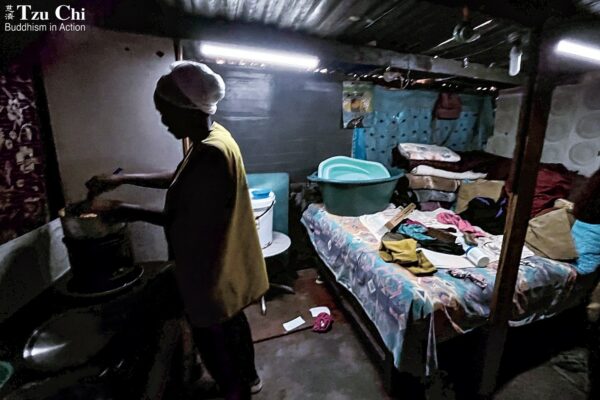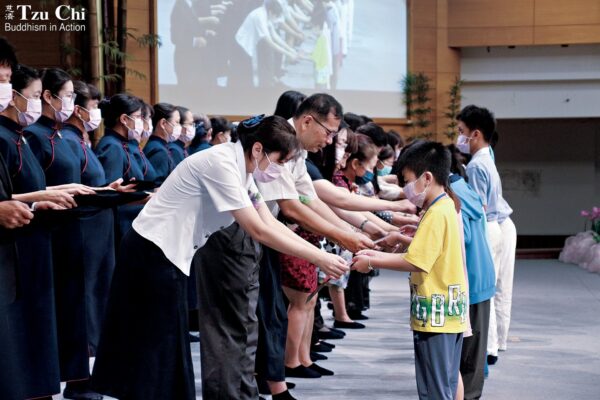Translated by Teresa Chang
Every day, I observe the world’s events—from climate change to conflicts between nations—witnessing crises, human suffering, and impermanence. I also see Tzu Chi volunteers active in many countries, working independently or with other non-governmental organizations to provide care in areas affected by fires, floods, earthquakes, or other disasters. Seeing the images from these disaster areas is truly heart-wrenching. At the same time, it reminds me of how fortunate we are to live in safe, clean, and orderly environments.
In summer, we have air conditioning; in winter, we have heating. We live financially carefree lives, with no shortage of food and clothing, and enjoy convenient transportation. We should feel very content. However, blessings do not happen without a reason; they are the result of past deeds that created safety, wealth, and other good circumstances. As we count our blessings, it is important to create more blessings. We can do this by reducing our desires and by giving more.
More than 2,500 years ago, Prince Siddhartha—later known as the Buddha—witnessed the grim realities of human existence when he ventured beyond his palace walls, including poverty, aging, sickness, and death. In response, he renounced his comfortable life in the palace to seek an end to suffering. Recognizing the limits of individual effort, he embarked on a quest to discover a universal path that could liberate all beings from the suffering and afflictions of life.
As a follower and proponent of Buddhism, I have always aspired to honor the Buddha by contributing to the welfare of his birthplace and other significant locations in his life journey. My disciples in Malaysia and Singapore understand my aspirations and are helping me fulfill this goal. They have been dedicated to this mission for more than two years now. Setting aside their jobs and careers, they spend extended periods of time in Nepal and India, where they engage in charitable, medical, and educational work. It is crucial for them to establish a deep and lasting connection with local communities to create a meaningful impact; this is why extended stays are essential. They have willingly sacrificed the comforts they could have enjoyed in Malaysia and Singapore to volunteer in Nepal and India, adapting to local climates and overcoming various challenges to serve local needy people. Their commitment reflects great courage.
I feel that my life is truly worthwhile when I see how our volunteers walk together on the Bodhisattva Path, sharing the same altruistic aspirations. I hope that our dedication to this path will be lasting. Those who led the way diligently served people in need, while those that follow must do the same, moving forward with mindful resolve. Generation after generation, we must ensure that our steps remain steady and firm, always staying true to our path.
Time passes from seconds to minutes, hours, and days. With 60 seconds in a minute and 24 hours in a day, 86,400 seconds tick by each day. While this seems like a lot, it slips away quickly and silently. The best approach is to make the most of the present moment and avoid letting a single second pass by with regret. Living this way leaves us with a clear conscience. Therefore, we must stay vigilant. If we remain unaware and constantly think about ourselves, what we lack, or compare ourselves with others, we will miss the essence of time. Living in comparison and calculation is truly bitter and a waste of time.
Everyone possesses the same wisdom as the Buddha, but deluded thinking and inner impurities prevent us from realizing this inherent potential. This is the greatest obstacle in life. The teachings of Buddhism are truly worth exploring. They guide us to purify our hearts and minds. By eliminating mental pollutants, such as greed, hatred, ignorance, arrogance, and doubt, we can uncover our clear and true nature. Only then can we clearly see our way and know how to follow it.
The Buddha came to this world to teach the Bodhisattva Path and share its wisdom with us, and we are now learning it. To truly learn, we must have a simple and childlike heart. The Bodhisattva Path leads to Buddhahood, and without following it, true awakening is unattainable. We must be aware that our lives become shorter with each passing day. Recognizing the fleeting nature of time, we should use it wisely by embracing goodness and creating blessings for humanity. Let’s focus on pursuing learning, self-cultivation, and altruism. Please be ever more mindful.

Dharma Master Cheng Yen encourages all Tzu Chi volunteers to remain steadfast on the Bodhisattva Path, continually cultivating themselves and contributing to the common good. Huang Xiao-zhe



